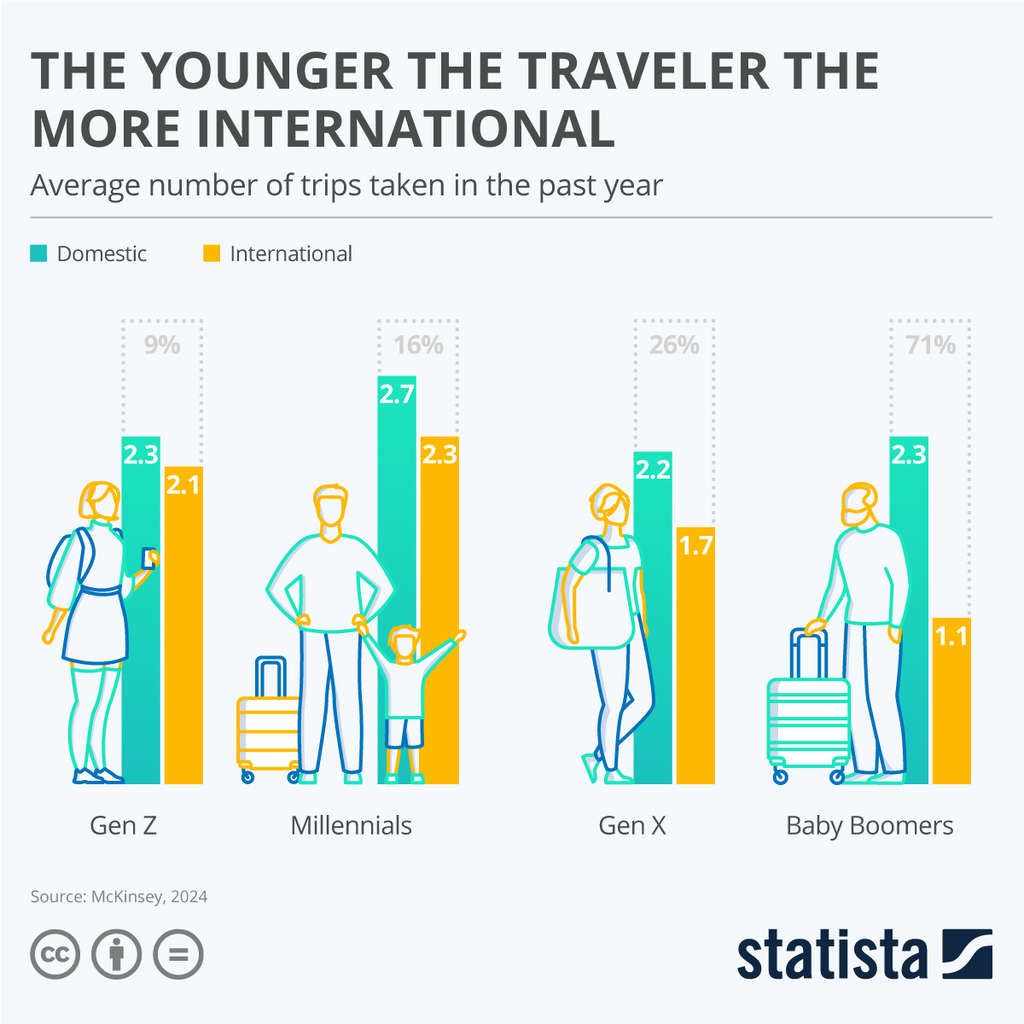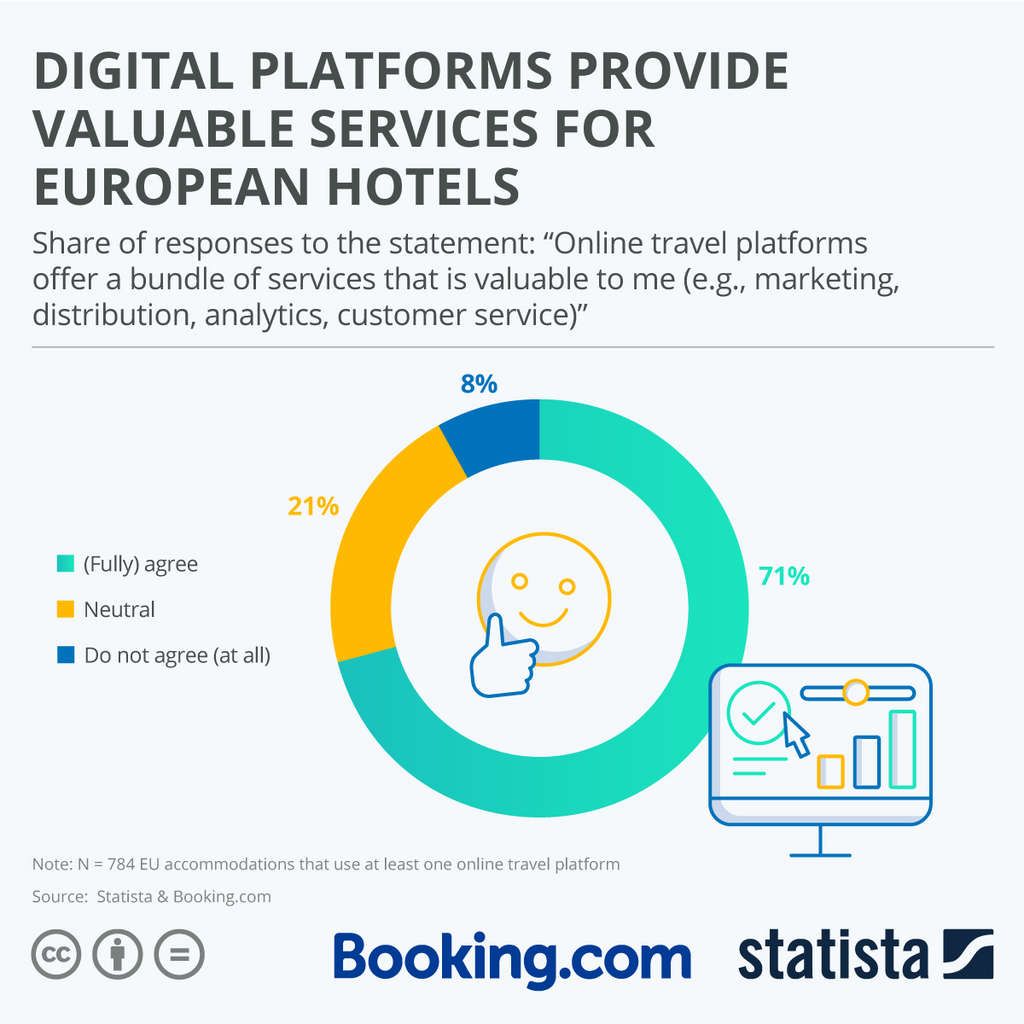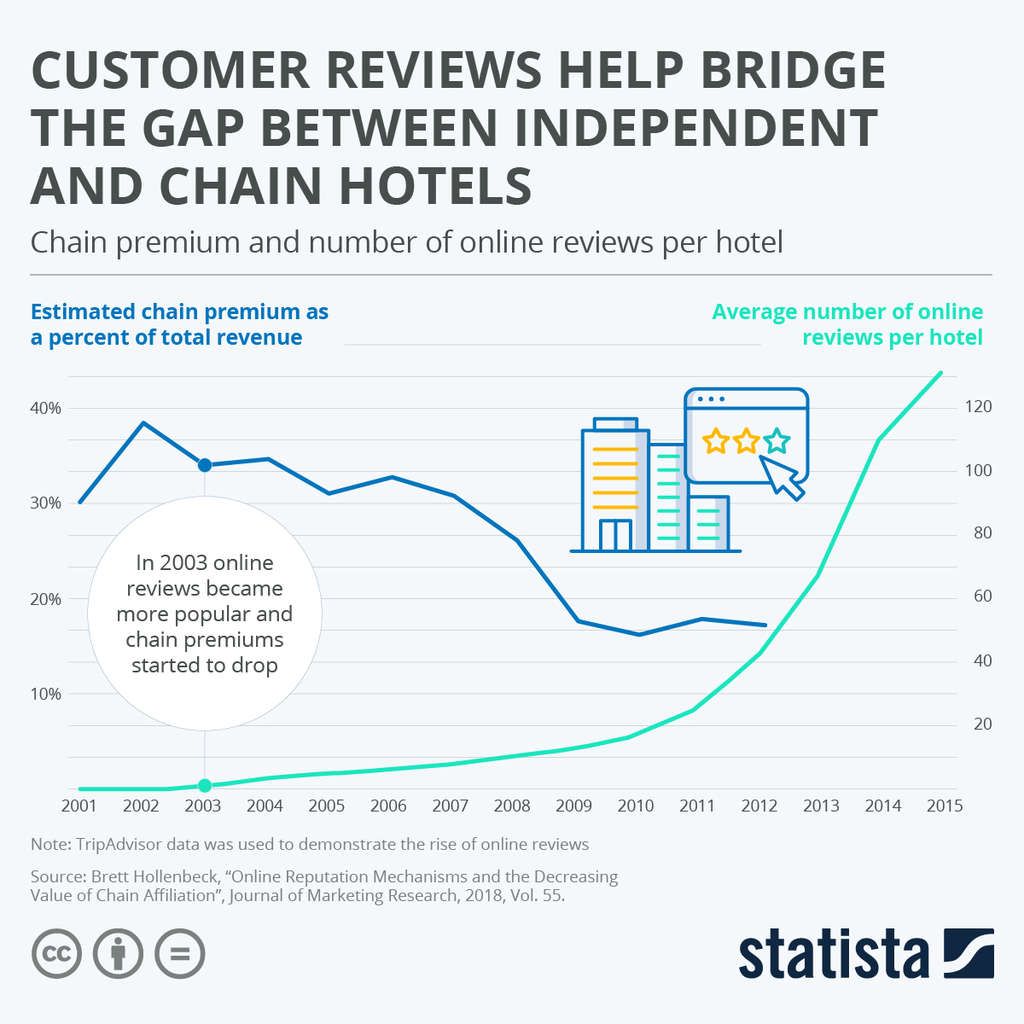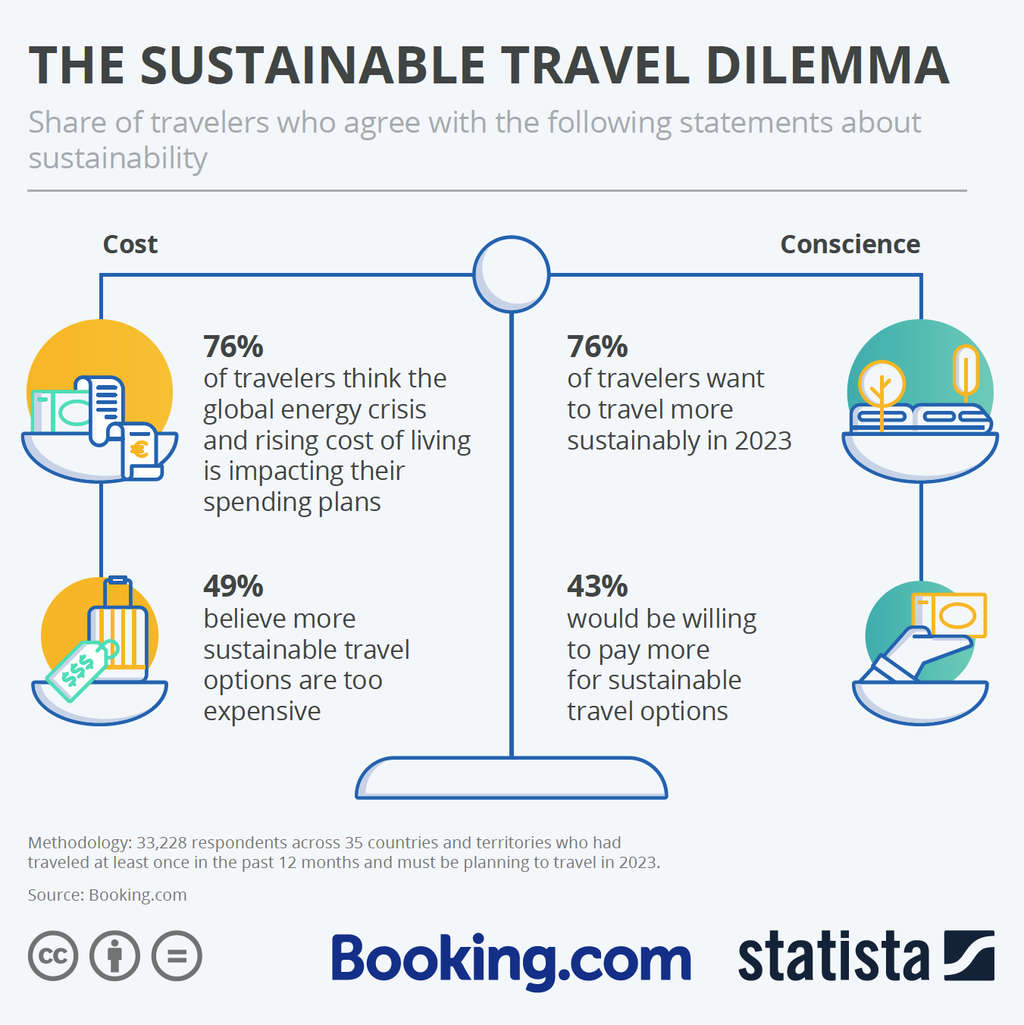The European travel and tourism sector is not just an economic powerhouse; it’s a vibrant ecosystem driven by millions of businesses. A vast majority of them are SMEs (small and medium-sized enterprises) forming the heart of the industry, offering everything from family-run B&Bs to boutique hotels, all while keeping the wheels of local economies turning.
Our new book The Titans of Travel: How Small Businesses Shape Europe’s Accommodation Industry in 50 Charts, investigates the data, trends, and insights that highlight the resilience and creativity of these enterprises. Here’s a sneak peek, featuring one chart per chapter, and you can download the eBook free of charge to explore this fascinating topic further.
Travel and tourism SMEs in a nutshell
Small businesses play a crucial role in European competitiveness, innovation, and regional development. Representing 99.8% of all enterprises in the non-financial business sector, SMEs provide employment for nearly two-thirds of the workforce in Europe.
The tourism sector contributes one out of every ten euros in the EU’s GDP. The industry’s impact extends beyond direct spending by tourists to include investments in infrastructure, cultural preservation, and enhanced global connectivity. According to World Travel & Tourism Council, the sector’s footprint in Europe is expected to grow further, with forecasts predicting an increase in GDP contribution from €2.25 trillion in 2023 to €3 trillion by 2034. The tourism industry finds itself in the top five of the EU’s 14 industrial ecosystems for both: employment and value creation.
Hospitality SMEs help balance regional economic disparities by providing employment in less urbanized areas and supporting local communities. These enterprises are set to play a key role in Europe’s continued travel industry growth and resilience.
Small businesses in hospitality are facing headwinds
Pivotal to Europe’s travel and tourism industry, SMEs face significant challenges compared to their larger counterparts. Studies, such as Statista Inc. and Booking.com’s Accommodation Barometer series, highlight a business sentiment gap which underscores the struggles smaller enterprises face in an increasingly competitive environment.
Chain hotels benefit from universal brand recognition, advanced technology, and better access to capital, positioning them favorably over independent players, the vast majority of which are SMEs. For instance, only 57% of small accommodations expect positive economic development in the next six months, compared to 82% of large hotels. This disparity extends to financing, with 32% of microenterprises struggling to secure funds, as opposed to a quarter as many for the larger entities.
SMEs are more vulnerable to shifting consumer trends and economic uncertainties, be they rising costs, energy prices, or geopolitical tensions. Independent properties, for example, feel more impacted by shorter stays and cost-cutting behaviors of travelers. The 2024 Barometer reveals that the risk of business closure is twice as high for SMEs compared to larger hotels. Despite these challenges — or perhaps because of them — the resilience of SMEs is vital for sustaining local economies and preserving the diversity of Europe’s tourism landscape.
Sector dynamics, chainification, and local value creation
Driven by a strong recovery in tourism and high expectations for the future, the European hotel sector is booming. In 2021 alone, €17.9 billion was invested in new construction. Chain hotels are steadily increasing their presence in Europe, now accounting for 43% of hotel rooms, eroding the traditionally strong position of independent establishments, a vast majority of which are SMEs.
This trend mirrors the U.S., where chainification has seen the share of independent hotels plummet from two-thirds in 1990 to just 28% in 2022. The impact on local economies is significant, and many lessons can be learned from the retail industry and how it was reshaped by the arrival of big box stores, first in the US and now, increasingly, in Europe.
We review studies exploring how the decline of SMEs can lead to millions in lost wages, a decline in local value generation, and, perhaps most importantly, a net loss of jobs.
As the accommodation industry in Europe continues to evolve, we must remain aware of trade-offs and meet the challenge of balancing the growth of global hotel brands with the need to support local businesses and sustain regional economies.
Structural shifts and megatrends
Global enterprises have strong wind in their sails, buoyed by a series of technological and societal trends that have unfolded over decades. The rise of budget airlines revolutionized air travel, making it more affordable and accessible, which in turn fueled international tourism and economic growth across previously underserved regions. Europe, the world’s most popular tourist destination, continues to benefit from these shifts, with international arrivals more than doubling in the two decades before the pandemic.
As the growth in cross-border travel increasingly outpacing domestic tourism, hotel chains with a global name recognition are well-positioned to capitalize on this trend. Younger generations, particularly Millennials and Gen Z, are driving this international surge, drawn by the allure of new experiences and the growing accessibility of cross-border travel. Meanwhile, China is set to dominate outbound travel spending in the coming decade, further solidifying the importance of global reach for businesses in the tourism sector.
Bolstered by brand consistency and customer loyalty programs, global hotel chains are expanding fast, but that poses challenges for independent properties that have to either join a chain or find new ways to compete in a market that increasingly favors scale and international presence.
Open Digital Platforms empower European SMEs to compete
Global chains with international name recognition may have scale and customer awareness on their side, but open digital platforms are leveling the playing field for European SMEs, enabling them to compete more effectively and achieve greater success.
SMEs in the EU face a host of challenges, from a shortage of skilled staff to rising production costs and stiff competition. Customer acquisition is in the top five. By leveraging digital platforms, these small businesses can reach more prospective guests, reduce operational costs, and enhance their visibility on a global scale.
In the hospitality sector, listing properties on digital platforms has become a go-to strategy for many European hoteliers, with nearly half identifying it as a top tool for maximizing occupancy. Mixing and matching a variety of marketing tools, even the smallest establishments to tap into a worldwide pool of travelers, significantly boosting bookings and, ultimately, profitability. In fact, 80% of independent hotels surveyed in 2021 by the European Commission reported an increase in bookings after joining online travel agencies. The same finding was replicated more recently in the survey we conducted in partnership with Statista.
The benefits don’t stop at increased bookings. A 2024 study revealed that 74% of EU accommodations found their participation in online travel platforms made their businesses more profitable. Validated by independent empirical research, this boost is especially pronounced for smaller properties, which see the highest gains in profitability when leveraging these digital tools.
Customer reviews, rankings, and the magic of matching supply with demand
Customer reviews, online rankings, and the advent of digital platforms have revolutionized the travel and tourism industry for the benefit of all involved: empowering consumers and hospitality entrepreneurs alike. The once-dominant and often opaque hotel star classification system now takes a backseat to more dynamic, user-generated reviews, which provide real-time insights into guest experiences.
This shift not only enhances transparency for travelers but also levels the playing field for independent and smaller hotels, allowing them to compete with larger, chain-affiliated properties by leveraging positive feedback. In some sense, these reviews counterbalance the brand-recognition advantage that global chains have over local players.
Digital platforms provide rural and lesser-known accommodations with a chance to shine. Traditionally, city-based hotels enjoyed the lion’s share of bookings, but online travel platforms, by virtue of their operating model, create visibility for all partners. The consequence is the disbursal of travel that benefits rural properties first and foremost.
Customer reviews also offer critical insights for hoteliers, aiding in managerial decisions. By analyzing trends and feedback, hotels can make targeted improvements, adjust their offerings, and ultimately better match supply with demand. This creates a mutually beneficial ecosystem where travelers find exactly what they’re looking for, and accommodations enhance their competitiveness.
Preserving the diversity, vibrancy and resilience of European Accommodations
As small businesses navigate economic uncertainties, they look towards supportive government policies to ensure stability and growth. While politicians — be they small town mayors or EU Commissioners — often prioritize SMEs, in the accommodations sector we find that larger chain properties perceive government policies as beneficial to their business success. Their smaller, independent counterparts are less convinced.
Confronted with the pressing challenges of climate change, European hoteliers are making significant investments in resilience and sustainability. This collective effort emphasizes the importance of collaboration among governments, service providers, and travelers. By integrating sustainable practices and advocating for supportive policies, the hospitality sector can enhance its vibrancy and help Europe maintain its leadership as the world’s favorite destination.
Conclusion
The European travel and tourism sector is as diverse as it is dynamic, and small businesses are at the heart of its success. These seven insights barely scratch the surface of what’s explored in The Titans of Travel. Download your free copy to dive deeper into the trends, challenges, and opportunities shaping the future of travel.
View source








